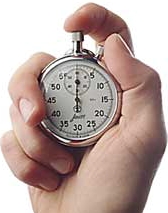Are you short for month at the end of each month? Do you have 5-10 credit cards, all maxed out to the limit? Do you forget to pay your bills on time? If you have answered, “Yes,” to any of these questions, don’t feel bad and don’t worry. I have some tips that can help you improve your financial picture: Create a Bill-Paying System
 The first thing you’ll need to do is to go out and pick up some colored hanging folders. If you don’t have a file cabinet, get a file box that you can find in any stationery store or discount department store. They’re very inexpensive. Then, make a folder for each expense. Use one color for your bank statements, another for your utility bills, and another for credit cards. Keep the system pretty simple or complexity could let procrastination) take over.
The first thing you’ll need to do is to go out and pick up some colored hanging folders. If you don’t have a file cabinet, get a file box that you can find in any stationery store or discount department store. They’re very inexpensive. Then, make a folder for each expense. Use one color for your bank statements, another for your utility bills, and another for credit cards. Keep the system pretty simple or complexity could let procrastination) take over.
Each day when your mail arrives, separate it immediately into what you don’t need and want to throw away and your bills and other things that need attention right away. Do the things that are needed and either pay the bill right away or put them in a central place where you can retrieve them when the money is available for paying the bills. This could be the front of a desk drawer, for instance, or even a basket on top of your desk. Just be sure that nothing goes into that basket besides your bills.
Online banking is a great way to streamline the bill paying process. Bank security is top notch, so the question of you having a problem online is really out of the equation. The chances are very slim. So, what you do is you take each bill that you receive and you put the information needed into the online banking account. You don’t have to do this all at once. Wait until your next bill comes in and do it one or two at a time. That way, it seems less daunting, and remember, you only have to do it once. After all the information has been entered, paying a bill becomes as simple as clicking a button, a mouse button, that is.
When you’re finished paying your bills, be it online or off, put the paid bills with the date of payment written on the front, into one of the colored file folders. That way, when tax time comes around, all your financial records will be at your fingertips.
Don’t carry around huge wads of cash or a debit card linked to your bank account, either. If you prefer the convenience of plastic, open a separate bank account and put a monthly “allowance” into it for yourself. When the money’s gone, you’ll just have to wait until next month to get more. This should help you to budget your spending and hold back on those impulse purchases a little.
And if you want to buy something, decide whether you need it or just simply want it. If you think you need it, just walk away and take 25 hours or longer to consider the purchase. Once it’s out of your site, you may find that it’s really a want, disguising itself as a need.
Before you pay any bill, any expense for the month, you should always be paying yourself. Ten percent of your income, every time you get money or a paycheck, should go into a savings account. If you don’t have a savings account, get one and never, ever use it except for depositing. Your savings account is for huge expenses, like buying a house, repairing your car, or retirement.
Put at least one of these tips into practice and see how well it works for you. I guarantee that you’ll be back to try another.
 Money earned can either be consumed or saved. When money is saved it can either be hoarded or be invested to enhance its value. An investment project requires information about the various avenues available.
Money earned can either be consumed or saved. When money is saved it can either be hoarded or be invested to enhance its value. An investment project requires information about the various avenues available.









